Mary Reed Newland
How to Raise Good Catholic Children
SOPHIA INSTITUTE PRESS
Manchester, New Hampshire
How to Raise Good Catholic Children was originally published in 1954 by P. J. Kenedy and Sons under the title We and Our Children. This 2004 edition by Sophia Institute Press includes minor editorial revisions to correct infelicities in grammar and to update or omit dated material. New chapter titles and subheadings have also been added.
Copyright 2004 Sophia Institute Press
Printed in the United States of America
All rights reserved
Cover design by Theodore Schluenderfritz
No part of this book may be reproduced, stored in a retrieval system, or transmitted in any form, or by any means, electronic, mechanical, photocopying, or otherwise, without the prior written permission of the publisher, except by a reviewer, who may quote brief passages in a review.
Sophia Institute Press
Box 5284, Manchester, NH 03108
1-800-888-9344
www.sophiainstitute.com
Nihil obstat: Rev. Andrew A. Martin, Censor Librorum
Imprimatur: Christopher J. Weldon
Bishop of Springfield, Massachusetts, August 13, 1954
Library of Congress Cataloging-in-Publication Data
Newland, Mary Reed.
[We and our children]
How to raise good Catholic children / Mary Reed Newland.
p. cm.
Originally published: We and our children. New York : P. J.Kenedy and Sons, 1954.
ISBN 1-928832-86-5 (pbk. : alk. paper)
1.Christian education Home training. 2. Catholic children Religious life. 3. Christian education of children.4. Catholic Church Education. I. Title.
BV1590.N4 2004
248.845088282 dc22 2003027846
To our Lady
for her birthday
Contents
Chapter 1
Introduce your child to God
Not long ago, I heard someone who has worked long and hard in apostolic causes described as deeply spiritual but , like the saints, so impractical. That contradiction sums up as nicely and neatly as possible the confusion of most moderns some Catholics among them with respect to mans end, the things that are Gods, and the spiritual life. Highly impractical...
It was an odd remark coming from someone who, if he were asked, would reply in the next breath that man is made to know and love and serve God on this earth and be happy with Him forever in Heaven. If we must face the fact that death is inevitable (and we certainly must) and that eternity begins right on its heels, then to imitate the saints is not unpractical, but quite as practical as it is possible to be. After all, the saints are the only ones we know for sure have arrived at the forever in Heaven. And when you realize that the spiritual life thrives in proportion as we cultivate the life of God in our soul, then to attempt a spirituality like the saints is the only kind of living that makes any sense.
The saints, contrary creatures, lived as though the soul were all, and as an afterthought gave a nod now and then to the body. To their own bodies, that is; they poured out endless charity on the bodies of others. Not that they despised their own bodies no saint despises the work of Gods hands but they understood them well: their corruptibility, their weakness, their nuisance value, all inherited through Original Sin. So, rather than depend on their short-lived and highly fallible flesh, they turned their entire attention to the soul.
Peculiarly enough, once the saints concentrated on the soul, it followed that the body fell in line, subdued and obedient, and their comings and goings in this world were marked with remarkable perspicacity and acumen. They got more work done, undertook and accomplished more impossible things, acquired more friends and influenced more people than whole regiments of worldlings steeped in the rules for success.
Teach your child to love God
Its amusing to observe the contradictions apparent in the comparison of materialism versus spirituality, but its not amusing for long because theres more involved than a game. Each man caught in the embrace of materialism is a soul in danger of hellfire, and each soul is infinitely precious to God. For those of us who are parents, the challenge is terrible indeed. We have placed in our care for a few short years precious immortal souls who belong to God, whose destiny is an eternity in and with God, and who depend entirely upon us for the formation of a way of life that will lead them surely to God. And woe to us if we fail in this charge.
Who would blame a child who runs headlong into the path of an onrushing truck if his parents have failed to warn him of the perils of trucks? And who would blame a child who fires a loaded gun, killing his friend, if his parents have failed to warn him of the perils of guns? Then who shall blame a child whose soul turns eagerly to the noise and distraction of worldliness, if his parents have failed to show him that love and peace and beauty are found only in God?
It were better for him if a millstone were hung about his neck and he were cast into the sea, than that he should cause one of these little ones to sin. That is Christ, speaking of scandal. And the scandal of the neglected souls of children is manifest all about, in their confusion and delinquency, and of children grown up to adulthood in their godlessness and immorality.
He who abides with me, and I in him, he bears much fruit; for without me you can do nothing. That is Christ, too, speaking of the spiritual life. No need to argue more about imitating saints, nor look any further for a reason we should start now, in their earliest years, to show our children why, and, as best we can, how one sets about trying to be a saint.
Theres no difference in terms of time in souls. A childs soul is not, although we may think of it that way, a child soul. Sin, not years, makes the differences in souls, and the only variation between the spiritual life for a child and for a grown-up is the means of communication. Although children are taught with simpler words and ways, the end of the teaching is the same. And if this seems too good to be true, and far too easy, remember, Whosoever does not accept the kingdom of God as a little child will not enter into it.
So it all begins with loving God, and learning how He loves us. That he is loved by God is very easy for a child to believe. Hes hungry to be loved, and its a hunger God planted in him. His reaction to the knowledge of Gods love is perfect faith. Its no accident, nor is it a matter of taking advantage of his emptiness of knowledge. The virtue of faith is his at the moment of Baptism, infused into his soul by the Holy Spirit. What we see happening in our children when we introduce the revelation that there is a God and He loves them is inevitable. Its the first movement in them of the divine virtue of faith responding to the word of God. It slips into the life of a child so easily, without fanfare or excitement, that we hardly notice that it has happened.
Hes very little, and one day its time to tell him. We pat him dry, after his bath, and kneeling there, loving the marvel of his neat little body, we say, Stephen, do you know who made you?
Who made me?
God made you, Stephen.
Oh. And he stops, and thinks, and confirms it. God made Stephen.
And the gift of faith is at work. If one can say that God waits for things, then God has waited for this since forever. It is the beginning of why Stephen is here. To know God... And he trots down the hall to his crib, a different child that night because now he knows who made him. Many wise men may know many more things than Stephen, but may not know who made them.
When you tuck him in and say, Do you know why God made you, Stephen? he will hardly ever answer, No. But almost always, Why? And you tell him, Because He loves you. And Stephen knows the most important thing in all the world.

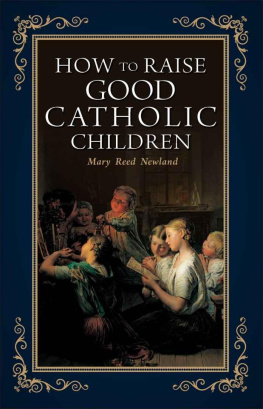
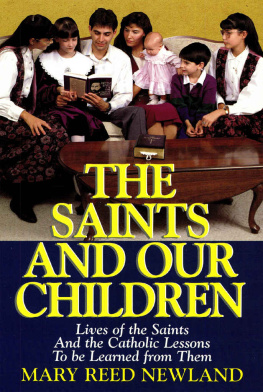
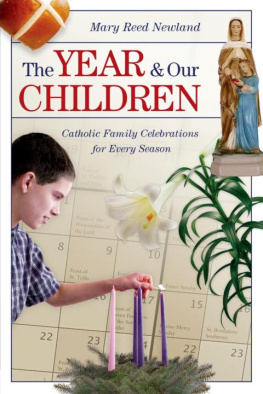
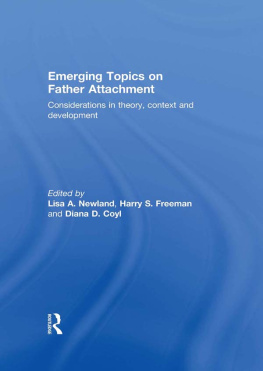
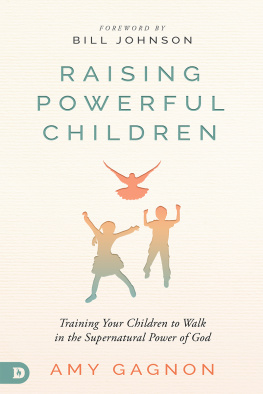
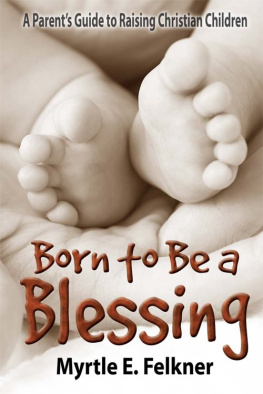

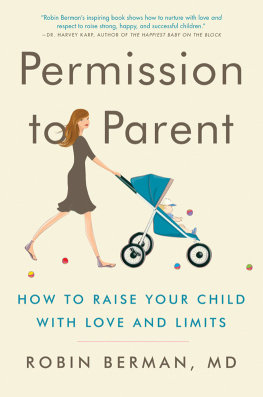

![Lawrence G. Lovasik - The Catholic Family Handbook: Time-Tested Techniques to Help You Strengthen Your Marriage and Raise Good Kids [CONTENT REVIEW: DO NOT PUBLISH]](/uploads/posts/book/259105/thumbs/lawrence-g-lovasik-the-catholic-family-handbook.jpg)


